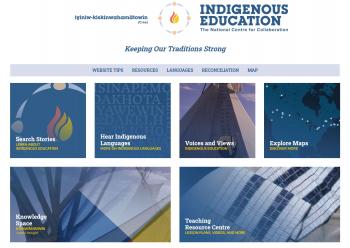Summary
Local Journalism Initiative Reporter
Windspeaker.com
The National Centre for Collaboration in Indigenous Education (NCCIE) is planning an all-day virtual conference for March 10 for those interested in learning more about education resources with an Indigenous ways of knowing and being perspective.
Belinda Daniels, who works with the NCCIE in a variety of roles, says the conference is being held in order to draw more eyeballs to the organization’s website (nccie.ca), which features resources for both students and teachers from Kindergarten to Grade 12.
One of the most extensive portions of the website is a teacher resource centre, featuring lesson plans and additional course materials in core subjects—math, science, art, and history. There is also on-the-land learning information, plus family and parenting courses.
Each lesson comes with a downloadable PDF guide for the teacher, as well as additional materials necessary, such as website links or video and audio clips to supplement the learning experience.
Some lessons are quite short — around 15 minutes, usually tailored to a younger age range — while others are full course sections that can last upwards of 10 to 15 hours of instruction. Most lessons are the length of an average class — between 45 and 90 minutes.
Another feature on the website is an interactive map that highlights stories of Indigenous knowledge across Canada. By clicking on a marker in any given region, a video featuring a person from that region will appear, along with a written description of the speaker and the knowledge they are offering.
The history of the NCCIE goes back over 40 years, with a focus on “celebrating the dedicated work by communities to strengthen Indigenous education for all generations,” states the organization’s website. The resources are hosted by the First Nations University of Canada, a federated college of the University of Regina.
The NCCIE noted in a release that regions across Canada have “co-developed these resources with community partners in the spirit of reciprocity – to ‘give back’ and ‘feed’ communities, contributing to the ever-growing set of on-line educational resources that privilege Indigenous Perspectives.”
However, they also note that their resources are not ‘one-size-fits-all.’ That means that first peoples’ cultural practices and knowledge differ from one peoples to the next. Specifically, the cultural practices or knowledge that is shared in a lesson plan relate principally to the land and the people where the lesson plan originates.
The resource centre also offers plans in a number of Indigenous languages, which are often intertwined with other subject materials, such as math, science or art.
Daniels, who refers to herself as a lifelong learner herself, recently submitted her PhD thesis in December at the University of Saskatchewan, titled in Cree: ē kakwē nēhiyaw pimātisiyā ōta nīkihk: The Lifelong Journey Home. The topics discussed in the thesis include a history of Cree and Indigenous language revitalization, as well as her own history of education in Indigenous culture.
She also explores in the dissertation what she feels should happen in language education, stressing parents of students should be included whenever possible, even when they may not have formal training or a postsecondary degree.
“They’re that child’s first teacher,” she said. “We need to bring parents along in this journey of language reclamation and they need to be a part of the schools, the learning, the transmission. They have so much knowledge that we need to recognize from parents: what they hold, and what they contribute.”
As the NCCIE website was developed, beginning in the summer of 2019 before the 2020 launch, Daniels worked as one of the curriculum leaders. Her job was to create and edit lesson plans. These days, she’s reaching out as a Knowledge Mobilizer Coordinator through social media and the internet at large in order to bring attention to the NCCIE’s work. Daniels targets teachers and schools, post secondary institutions and teacher certification programs, while also assisting regional leads across the country.
While the conference’s guests and schedule of events has yet to be released, Daniels says that more information will be available with a sign-up page on the NCCIE’s website and social media pages in the weeks leading up to the event. There is no cost to attend the conference.
Local Journalism Initiative Reporters are supported by a financial contribution made by the Government of Canada.

